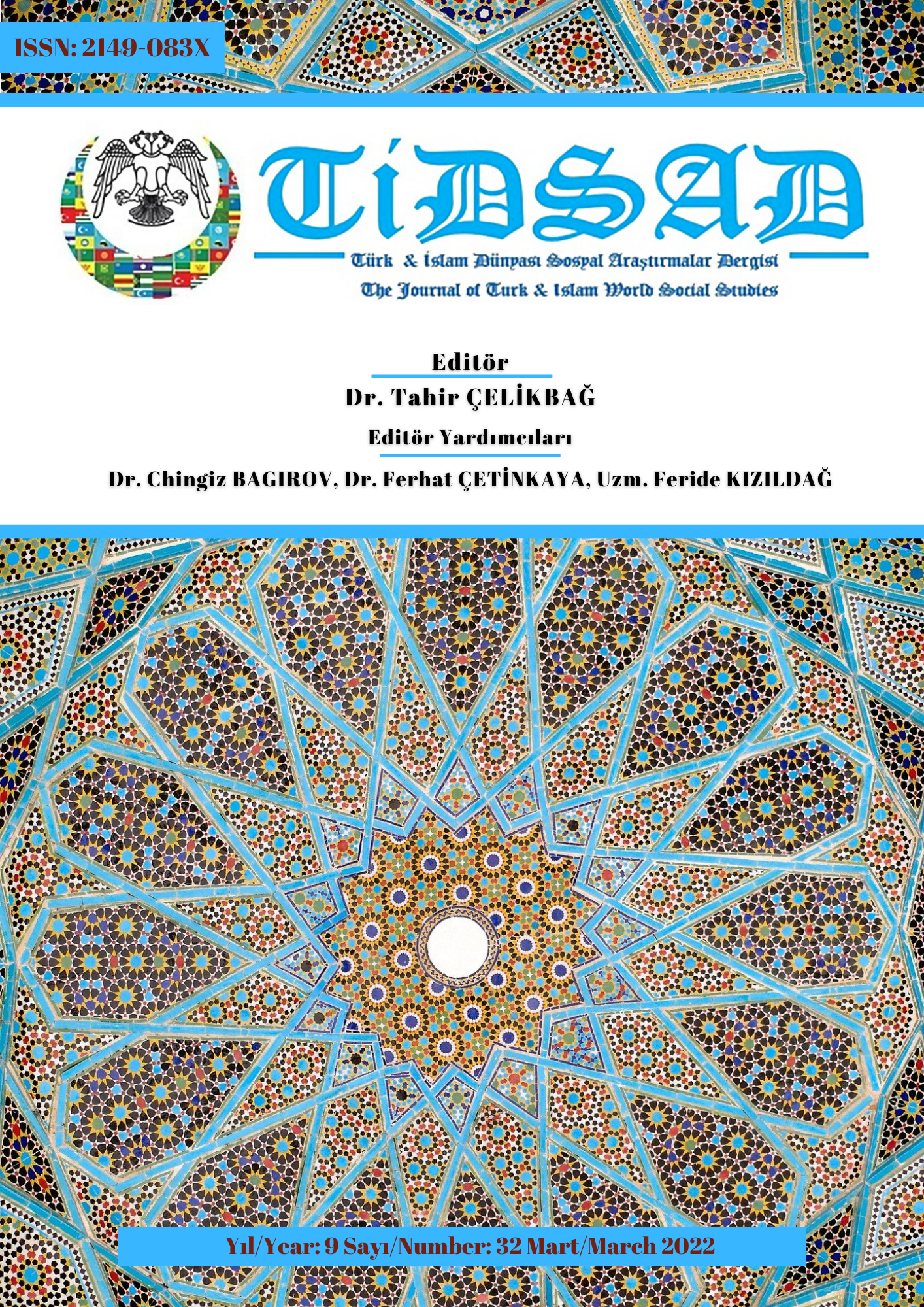Author :
Abstract
Tefekkür kelimesi, “fikir” kökünden gelir. Düşünceye hareket vermek demektir. Alemde görülen ilâhi işler ve sanat eserleri üzerinde, Yaratıcının, Sanatkarın sıfatlarını, hikmet ve gayelerini anlamaya çalışmaktır. Kendine has bir söyleyiş ve sanatkârane bir üslûpla Türkçe’de bir tefekkür ve tasavvuf dili meydana getiren Yunus, Batı Türkçesi’yle ilk ve en güzel şiirleri söylemiştir. Onun tefekkürü sanatını, sanatı tefekkürünü hiçbir zaman gölgede bırakmamıştır. Bu yazımızda amaç, Türk kültür ve inancına katkıda bulunmak için, dil- düşünce-tefekkür bağlantısında, Türk tasavvuf ve tefekkür şiirini, örneklerle değerlendirmektir. Bu konuda da, sehl-i mümteni ve mükemmel mecazlarla vücut bulan akıcı üslubu sayesinde, ilâhileri asırlarca okunup günümüze ulaşan Yunus’un hayatı hakkında küçük malumatlar, dil ve sanat özellikleri ile birlikte, tefekkürünün örneklerini öz olarak vermek istedik. Yunus’un, şiirlerinde “Her şeyde Allah’ın varlık ve birliğini gösteren bir delil ve pencere vardır.” gerçeğiyle tefekkür yoluyla, varlıklarda, İlâhî varlık ve birliği keşfettiğini görüyor, yüce gerçekleri kolay bir şekilde, sade bir dille ifade ettiğini müşahade ediyoruz.
Keywords
Abstract
The word contemplation comes from the root “idea”. It means giving action to thought. It is trying to understand the attributes, wisdom and aims of the Creator and the Artist on the divine works and works of art seen in the world. Yunus, who created a language of contemplation and mysticism in Turkish with a unique utterance and an artistic style, sang the first and most beautiful poems in Western Turkish. His contemplation has never overshadowed his art, his contemplation of art. The aim of his article is to evaluate Turkish Sufism and contemplation poetry with examples in the connection of language-thought-contemplation in order to contribute to Turkish culture and belief. In this regard, thanks to his sehl-i mumteni and his fluent style embodying perfect metaphors, we wanted to give examples of hia reflection, along with small information about the life of Yunus, whose hymns have been read for centuries and have reached the present day, along with small information about the life of Yunus, whose hymns have been read for centuries and have reached the present day, along with language and art features. In the Yunus’s poems, “There is an evidence and a window that shows the existence and unity of God in everything.” We see that he discovered the divine existence and unity in beings on the path of contemplation with the truth, and we observe that he expresses the supreme truths easily and in plain language.
Keywords
- Bakırcıoğlu, N. Ziya, Yunus Emre Divanı, Ötüken Neşriyat, İstanbul 2017.
- Banarlı, Nihad Sami, Resimli Türk Edebiyatı Tarihi I. İstanbul 1971.
- Bilmen, Ömer Nasuhi, Kur’an-ı Kerim’in Türkçe Meali Alisi ve Tefsiri, Bilmen Yayınevi, İstanbul 1968.
- 24 İsmail Hakkı Bursevi, Niyazi Mısrî, Şeyhzade, Çıktım Erik Dalına, Hazırlayan Ak Suat, Büyüyenay Yayınları, İstanbul 2012, s. 130.
- 25 FİLİZOK, Rıza, Prof. Dr., Yunus Emrenin Üslubu, Uluslar arası Yunus Emre Sempozyumu Bildirile- ri, Yunusemre Belediyesi, Manisa 2016.
- Demirci, İbrahim, Yunus Emre/ Seçme Şiirler, Konya Büyükşehir Belediyesi Kültür Yayın- ları, Konya 2006.
- Devellioğlu, Ferit, Osmanlıca- Türkçe Ansiklopedik Lûgat, Aydın Kitabevi Yayınları, Ankara 1996.
- Filizok, Rıza, Prof. Dr., Yunus Emrenin Üslubu, Uluslar arası Yunus Emre Sempozyumu Bildirileri, Yunusemre Belediyesi, Manisa 2016.
- Gölpınarlı, Abdülbâki (Hazırlayan)Vilâyetnâme, Menâkıb-ı Hünkâr Hacı Bektaş-ı Veli, İs- tanbul 1958.
- Gölpınarlı, Abdülbâki, Yunus Emre-Şiirleri, İstanbul 1971.
- İsmail Hakkı Bursevi, Niyazi Mısrî, Şeyhzade, Çıktım Erik Dalına, Hazırlayan Ak Suat, Bü- yüyenay Yayınları, İstanbul 2012.
- Kırımlı, Burak,Yunus Emre Divanından Seçmeler, Şule Yayınları, İstanbul 2011.
- Ocak, Ahmet Yaşar, Babaîlik, TDV İslam Ansiklopedisi, c. 4, İstanbul 1991.
- Sözen, K. Prof.Dr.,“Din Tefekkür İlişkisi”. Diyanet İlmî Dergi 54, 2018.
- Şahin, İnci, Yunus Emre, Biyografi Dizisi, Semerkand Basım, İstanbul 2014.
- Timurtaş, F. Kadri, Yunus Emre Divanı, Kültür Bakanlığı Yay., Ankara 1980.
- Türk Dil Kurumu,TÜRKÇE SÖZLÜK 1-2, 9. Baskı, Ankara 1998.
- Yazır, Elmalılı M. Hamdi. Hak Dini Kur’ân Dili, Eser Neşriyat ve Dağıtım, İstanbul 1979.





